
Excalibur is the mythical sword of King Arthur that may possess magical powers or be associated with the rightful sovereignty of Britain. Traditionally, the sword in the stone that is the proof of Arthur's lineage and the sword given him by a Lady of the Lake are not the same weapon, even as in some versions of the legend both of them share the name of Excalibur. Several similar swords and other weapons also appear within Arthurian texts, as well as in other legends.

The Holy Grail is a treasure that serves as an important motif in Arthurian literature. Various traditions describe the Holy Grail as a cup, dish, or stone with miraculous healing powers, sometimes providing eternal youth or sustenance in infinite abundance, often guarded in the custody of the Fisher King and located in the hidden Grail castle. By analogy, any elusive object or goal of great significance may be perceived as a "holy grail" by those seeking such.

Lancelot du Lac, also written as Launcelot and other variants, is a character in some versions of Arthurian legend where he is typically depicted as King Arthur's close companion and one of the greatest Knights of the Round Table. In the French-inspired Arthurian chivalric romance tradition, Lancelot is an orphaned son of King Ban of the lost kingdom of Benoic, raised in a fairy realm by the Lady of the Lake. A hero of many battles, quests and tournaments, and famed as a nearly unrivalled swordsman and jouster, Lancelot becomes the lord of the castle Joyous Gard and personal champion of Arthur's wife, Queen Guinevere, despite suffering from frequent and sometimes prolonged fits of madness. But when his adulterous affair with Guinevere is discovered, it causes a civil war that, once exploited by Mordred, brings an end to Arthur's kingdom.

Mordred or Modred is a figure in the legend of King Arthur. The earliest known mention of a possibly historical Medraut is in the Welsh chronicle Annales Cambriae, wherein he and Arthur are ambiguously associated with the Battle of Camlann in a brief entry for the year 537. Medraut's figure seemed to have been regarded positively in the early Welsh tradition and may have been related to that of Arthur's son.
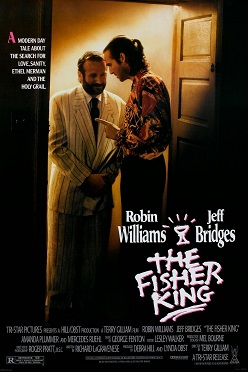
The Fisher King is a 1991 American fantasy comedy-drama film written by Richard LaGravenese and directed by Terry Gilliam. Starring Robin Williams and Jeff Bridges, with Mercedes Ruehl, Amanda Plummer, and Michael Jeter in supporting roles, the film tells the story of a radio shock jock who tries to find redemption by helping a man whose life he inadvertently shattered. It explores "the intermingling of New York City's usually strictly separated social strata" and has been described as "a modern-day Grail Quest that fused New York romantic comedy with timeless fantasy".

The Knights of the Round Table are the legendary knights of the fellowship of King Arthur that first appeared in the Matter of Britain literature in the mid-12th century. The Knights are an order dedicated to ensuring the peace of Arthur's kingdom following an early warring period, entrusted in later years to undergo a mystical quest for the Holy Grail. The Round Table at which they meet is a symbol of the equality of its members, who range from sovereign royals to minor nobles.

The Fisher King is a figure in Arthurian legend, the last in a long line of British kings tasked with guarding the Holy Grail. The Fisher King is both the protector and physical embodiment of his lands, but a wound renders him impotent and his kingdom barren. Unable to walk or ride a horse, he is sometimes depicted as spending his time fishing while he awaits a "chosen one" who can heal him. Versions of the story vary widely, but the Fisher King is typically depicted as being wounded in the groin, legs, or thigh. The healing of these wounds always depends upon the completion of a hero-knight's task.

Bors is the name of two knights in Arthurian legend, an elder and a younger. The two first appear in the 13th-century Lancelot-Grail romance prose cycle. Bors the Elder is the King of Gaunnes (Gannes/Gaunes/Ganis) during the early period of King Arthur's reign, and is the brother of King Ban of Benoic and the father of Bors the Younger and Lionel. His son Bors the Younger later becomes one of the best Knights of the Round Table and participates in the achievement of the Holy Grail.
King Pellinore is the king of Listenoise or of "the Isles" in Arthurian legend. In the tradition from the Old French prose, he is associated with the Questing Beast and is the slayer of King Lot. His many children include the sons Aglovale, Lamorak, and Percival, and the daughter Dindrane.

Parzival is a medieval chivalric romance by the poet and knight Wolfram von Eschenbach in Middle High German. The poem, commonly dated to the first quarter of the 13th century, centers on the Arthurian hero Parzival and his long quest for the Holy Grail following his initial failure to achieve it.
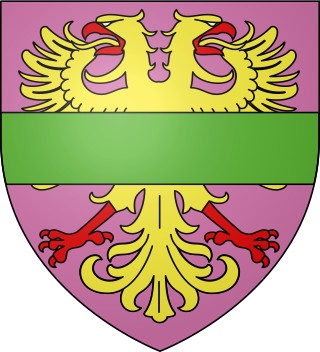
Sir Agravain is a Knight of the Round Table in Arthurian legend, whose first known appearance is in the works of Chrétien de Troyes. He is the second eldest son of King Lot of Orkney with one of King Arthur's sisters known as Anna or Morgause, thus nephew of King Arthur, and brother to Sir Gawain, Gaheris, and Gareth, as well as half-brother to Mordred. Agravain secretly makes attempts on the life of his hated brother Gaheris since the Vulgate Cycle, participates in the slayings of Lamorak and Palamedes in the Post-Vulgate Cycle, and murders Dinadan in the Prose Tristan. In the French prose cycle tradition included in Thomas Malory's Le Morte d'Arthur, together with Mordred, he then plays a leading role by exposing his aunt Guinevere's affair with Lancelot, which leads to his death at Lancelot's hand.
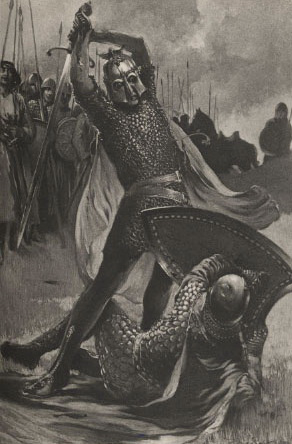
Accolon is a character in Arthurian legends where he is a lover of Morgan le Fay who is killed by King Arthur in a duel during the plot involving the sword Excalibur. He appears in Arthurian prose romances since the Post-Vulgate Cycle, including as Accalon in the French original Huth Merlin and Acalón in the Spanish adaptation El Baladro del Sabe Merlin.

Feirefiz is a character in Wolfram von Eschenbach's Arthurian poem Parzival. He is the half-brother of Parzival, the story's hero. He is the child of their father Gahmuret's first marriage to the Moorish queen Belacane, and equals his brother in knightly ability. Because his father was white and his mother black, Feirefiz's skin consists of black and white patches. His appearance is compared to that of a magpie or a parchment with writing on it, though he is considered very handsome.
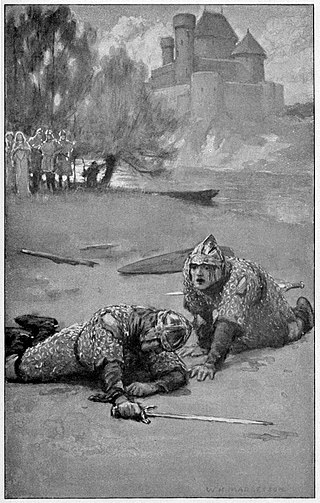
Sir Balin le Savage, also known as the Knight with the Two Swords, is a character in the Arthurian legend. Like Sir Galahad, Sir Balin is a late addition to the medieval Arthurian world. His story, as told by Thomas Malory in Le Morte d'Arthur, is based upon that told in the continuation of the second book of the Post-Vulgate cycle of legend, the Suite du Merlin.
The Wasteland is a Celtic motif that ties the barrenness of a land with a curse that must be lifted by a hero. It occurs in Irish mythology and French Grail romances, and hints of it may be found in the Welsh Mabinogion.
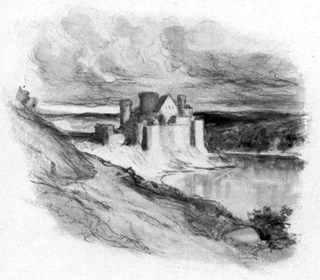
Corbenic is the name of the Grail castle, the edifice housing the Holy Grail in Arthurian legend. It is a magical domain of the Grail keeper, often known as the Fisher King. The castle's descriptions vary greatly in different sources, and it first appears by that name in the Lancelot-Grail cycle where it is also the birthplace of Galahad.

Legion is a 1983 horror novel by American writer William Peter Blatty, a sequel to The Exorcist. It was adapted for the film The Exorcist III in 1990. Like The Exorcist, it involves demonic possession. The book was the focus of a court case over its exclusion from The New York Times Best Seller list. Blatty based aspects of the Gemini Killer on the real life Zodiac Killer, who in a January 1974 letter to the San Francisco Chronicle had praised the original Exorcist film as "the best satirical comedy that I have ever seen".
The Evil Forest is a 1951 Spanish drama film directed by Daniel Mangrané. It was entered into the 1952 Cannes Film Festival.

Vagabond is the second novel in The Grail Quest series by English author Bernard Cornwell, first published in 2002. Set during the first stage of the Hundred Years' War, it follows Thomas of Hookton's quest to find the Holy Grail, a relic which will grant decisive victory to the possessor.

L'Enchanteur is a 1984 novel by the French writer René Barjavel. It tells the story of the Knights of the Round Table and the quest for the Holy Grail from the perspective of Merlin and his relationship with Viviane. Barjavel had studied the material on the Grail legend extensively. He added several new concepts to the backstory of the grail, placing its origin to the time of Adam and Eve. According to the novel, Eve used the cup to collect Adam's blood from the wound created when his rib was removed.

















